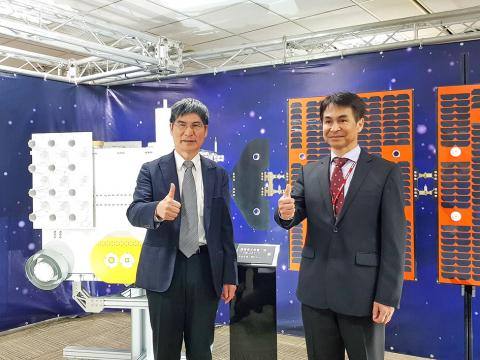The Ministry of Science and Technology yesterday announced plans to focus on the development of 10 small, high-resolution satellites for the third phase of the National Space Program.
The third phase, which is expected to cost NT$25.1 billion (US$814 million), was last month approved by Premier Su Tseng-chang (蘇貞昌).
It was the first official document he signed after taking office.

Photo: Chien Hui-ju, Taipei Times
It is to be executed by the National Applied Research Laboratories and the National Space Organization (NSPO) over a 10-year period starting this year, the ministry said.
The initiative would focus on the development of six prototype high-resolution optical remote sensing satellites, two ultra-high resolution smart optics remote sensing satellites and two synthetic aperture radar (SAR) satellites, it said.
It would also focus on the development of remote sensing technology and the use of smaller satellites to achieve higher resolution images, Minister of Science and Technology Chen Liang-gee (陳良基) said.
Citing an example, Chen said an ultra-high resolution smart optics remote sensing satellite weighing about 200kg would give users a 35cm view of the ground from an altitude of 510km, which would be the equivalent of spotting a cat or a dog in Pingtung County’s Kenting (墾丁) area from the Taipei 101 building.
The ministry plans to launch one satellite a year, he said, adding that the first is expected to be launched in 18 months.
The achievements of the first and second phases would serve as the foundation for the third phase, Chen said.
He hopes that the National Space Program would encourage innovation in the field of science, he added.
The prototype high-resolution optical remote sensing satellite constellation, which is to include three sets of two satellites, would raise the frequency of Formosat-5’s revisit rate from once every two days to twice or three times a day, NSPO director-general Lin Chun-liang (林俊良) said.
This would allow the ministry to gather more images, which has positive implications for the implementation of government policies, rescue missions, disaster prevention and scientific research, he said.
Ultra-high resolution smart optics remote sensing satellites focus on sub-meter resolution images, Lin said.
SAR satellites, which are equipped with active radar, are unaffected by cloud cover, fog or rainfall, which means they can function no matter the weather conditions or time of day, he said.
Other plans for the third phase include space exploration and the development of a satellite capable of orbiting the moon, Lin added.
As Taiwan lacks experience in these areas, it hopes to achieve its goal of space exploration by partnering with domestic and foreign academia, he said.
Having a satellite orbiting the moon would be the first step, he said.
Researchers would also explore ways to land a satellite on the moon, Lin added.
Without the assistance of GPS on the moon, the satellite would need to guide its own landing, he said.
Asked about the launch date of Formosat-7, Lin said that as Taiwan is partnering with the US for the launch, it would need to wait for the US to notify them.
Formosat-7’s six satellites are on standby at the NSPO, and can be packaged and delivered to the US as soon as it receives notice from the US, he said.
The ministry plans to launch Formosat-7 this year and a weather satellite called the “wind hunter” next year, Chen said.

Taiwan has received more than US$70 million in royalties as of the end of last year from developing the F-16V jet as countries worldwide purchase or upgrade to this popular model, government and military officials said on Saturday. Taiwan funded the development of the F-16V jet and ended up the sole investor as other countries withdrew from the program. Now the F-16V is increasingly popular and countries must pay Taiwan a percentage in royalties when they purchase new F-16V aircraft or upgrade older F-16 models. The next five years are expected to be the peak for these royalties, with Taiwan potentially earning

STAY IN YOUR LANE: As the US and Israel attack Iran, the ministry has warned China not to overstep by including Taiwanese citizens in its evacuation orders The Ministry of Foreign Affairs (MOFA) yesterday rebuked a statement by China’s embassy in Israel that it would evacuate Taiwanese holders of Chinese travel documents from Israel amid the latter’s escalating conflict with Iran. Tensions have risen across the Middle East in the wake of US and Israeli airstrikes on Iran beginning Saturday. China subsequently issued an evacuation notice for its citizens. In a news release, the Chinese embassy in Israel said holders of “Taiwan compatriot permits (台胞證)” issued to Taiwanese nationals by Chinese authorities for travel to China — could register for evacuation to Egypt. In Taipei, the ministry yesterday said Taiwan

Taiwan is awaiting official notification from the US regarding the status of the Agreement on Reciprocal Trade (ART) after the US Supreme Court ruled US President Donald Trump's global tariffs unconstitutional. Speaking to reporters before a legislative hearing today, Premier Cho Jung-tai (卓榮泰) said that Taiwan's negotiation team remains focused on ensuring that the bilateral trade deal remains intact despite the legal challenge to Trump's tariff policy. "The US has pledged to notify its trade partners once the subsequent administrative and legal processes are finalized, and that certainly includes Taiwan," Cho said when asked about opposition parties’ doubts that the ART was

If China chose to invade Taiwan tomorrow, it would only have to sever three undersea fiber-optic cable clusters to cause a data blackout, Jason Hsu (許毓仁), a senior fellow at the Hudson Institute and former Chinese Nationalist Party (KMT) legislator, told a US security panel yesterday. In a Taiwan contingency, cable disruption would be one of the earliest preinvasion actions and the signal that escalation had begun, he said, adding that Taiwan’s current cable repair capabilities are insufficient. The US-China Economic and Security Review Commission (USCC) yesterday held a hearing on US-China Competition Under the Sea, with Hsu speaking on